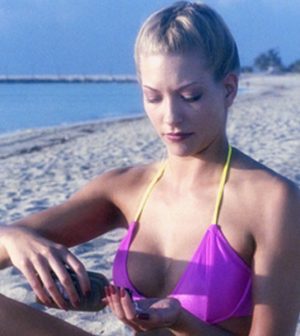- Could Your Grocery Store Meat Be Causing Recurring UTIs?
- Are You Making This Expensive Thermostat Error This Winter?
- Recognizing the Signs of Hypothyroidism
- 10 Strategies to Overcome Insomnia
- Could Artificial Sweeteners Be Aging the Brain Faster?
- Techniques for Soothing Your Nervous System
- Does the Water in Your House Smell Funny? Here’s Why
- Can a Daily Dose of Apple Cider Vinegar Actually Aid Weight Loss?
- 6 Health Beverages That Can Actually Spike Your Blood Sugar
- Treatment Options for Social Anxiety Disorder
Does Your Sunscreen Work for You?

Sunscreen is a real key to protecting your skin from the sun and preventing skin cancer, but are you using it correctly?
Santa Monica-based dermatologist Dr. Tanya Kormeili thinks not.
A recent American Academy of Dermatology (AAD) found “only about a third of Americans are reapplying their sunscreen every two hours while outside. Since sunscreen wears off, incorrect usage leaves you unprotected and susceptible to skin cancer,” Kormeili said in an AAD news release.
She outlined other common sunscreen mistakes and how to avoid them.
First, read the sunscreen labels. You should choose sunscreens that are broad-spectrum, water-resistant and have an SPF of 30 or higher.
Second, most people apply only one-quarter to one-half of the recommended amount of sunscreen. To fully cover their body, most adults need about 1 ounce of sunscreen, or enough to fill a shot glass. Apply enough sunscreen to cover all skin that isn’t covered by clothing. Apply it 15 minutes before going outdoors, and reapply every two hours while outdoors or after swimming or sweating.
Third, only 20% of Americans apply sunscreen on cloudy days, but the sun’s harmful ultraviolet (UV) rays go through clouds. Apply sunscreen every time you go outside, even under clouds.
Another mistake is using old sunscreen. Sunscreens are required to retain their original strength for at least three years. Throw out your sunscreen if it’s expired or you’re unsure how long you’ve had it. If you buy sunscreen that doesn’t have an expiration date, write the purchase date on the bottle so that you know when to stop using it.
“Sunscreen is the most important skin care product you can use, as it helps prevent sunburn, skin cancer and premature skin aging, including wrinkles and age spots,” Kormeili said. “However, to ensure the best protection for you and your family, it’s important to follow the manufacturer’s directions before using.”
She added, however, that no sunscreen can block 100% of the sun’s UV rays. So even when you use sunscreen, it’s also important to seek shade and wear protective clothing, including a lightweight, long-sleeved shirt, pants, a wide-brimmed hat and sunglasses with UV protection.
Skin cancer is the most common cancer in the United States, affecting 1 in 5 Americans in their lifetime, according to the AAD.
More information
The U.S. Centers for Disease Control and Prevention has more on sun safety.
Source: HealthDay
Copyright © 2026 HealthDay. All rights reserved.










